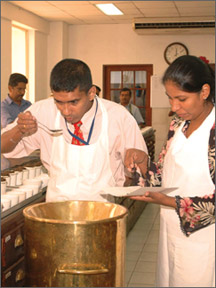Plantation industry needs long-term Master Plan - Malik Fernando
 In a press statement this week, Director Operations of the MJF Group,
Malik J. Fernando, the owners of the international Dilmah brand has
called for a Master Plan for the plantation sector. Fernando says an
industrywide Master Plan is required for Sri Lanka’s 150-year-old
plantation industry to re-align itself with internal and external
changes and to remain competitive. In a press statement this week, Director Operations of the MJF Group,
Malik J. Fernando, the owners of the international Dilmah brand has
called for a Master Plan for the plantation sector. Fernando says an
industrywide Master Plan is required for Sri Lanka’s 150-year-old
plantation industry to re-align itself with internal and external
changes and to remain competitive.
“We need to develop a common Master Plan that all stakeholders,
including the Government can work towards. Tea, the main plantation
crop, requires long-term strategic direction, but right now, this is
lacking. The entire plantation industry needs 5-10 year rolling plans to
enable long- term planning and financing of the required investments,”
Fernando said.
Changing landscape
Fernando, who joined the MJF Group as a Management Trainee 25 years
ago oversees the diversification activities of the Group, said the
current production model for tea is unsustainable given the high
production costs, low yields and volatile market prices.
“The industry is badly affected by high costs and low yields. Tea
prices were record high for the past 2-3 years cannot be expected to
remain at this level continuously,” said Fernando.
With a 30% wage hike in June 2011 is unsustainable with some high
grown estates already losing as much as Rs 150 per kg of tea. Fernando
points out that the Sri Lankan tea industry is uncompetitive against
international competitors.
 “As wages are 60% higher in Sri Lanka than in Kenya, and worker
productivity is 60% lower in Sri Lanka. The daily labour wage is now
over 150% of the value of a kilo of tea sold at the auctions. This is
only 80% in Kenya,” explained Fernando. “As wages are 60% higher in Sri Lanka than in Kenya, and worker
productivity is 60% lower in Sri Lanka. The daily labour wage is now
over 150% of the value of a kilo of tea sold at the auctions. This is
only 80% in Kenya,” explained Fernando.
Meanwhile, yields are dropping as tea companies cannot afford proper
agricultural practices.
This combination of rising production costs, lowering yields and
price uncertainty, Fernando, says, “is deadly”.
Re-aligning the tea sector
To re-align Sri Lanka’s traditional tea sector and face the future,
Fernando says government support is needed in long-term financing and
regulatory changes. As for financing, Fernando suggests a model similar
to India’s ‘Special Purpose Tea Fund’ for replanting, infilling and
rejuvenation aged tea bushes.
“A similar program could be offered in Sri Lanka to all growers, both
companies and smallholders. Export levy on bulk tea introduced last year
can fund part of this cost. Bank investment funds from VAT savings could
also be channelled for such activities. Out of Sri Lanka’s total
220,000ha of tea around 5000ha could be targeted for replanting
annually, under an accelerated program,” suggests Fernando.
On the regulatory front Fernando suggests the Government consider
lease extensions to 99 years, for companies that implement proper
agricultural and management practices. Restrictions on land use, by
Regional Plantation Companies (RPCs) should be reviewed, allow RPCs to
diversify land use, and a hedge against a downturn in a mono-crop
situation.
“We must move away from the perennial mono-crop model to a maximum
land productivity model. Which means planting rubber, oil palm, fuel
wood or other fruits or vegetables in fields that are not suitable for
tea,” explained Fernando.
“To reduce fossil fuel dependence, around 20,000ha of fuel-wood was
planted, with borrowed funds, a master plan with the approval of the
Forest Department. But companies were not allowed to harvest the
fuel-wood, even under supervised conditions.
 This has contributed to the increase in the cost of production due to
transportation of firewood and use of imported liquid fuel instead of
renewable fuel-wood,” Fernando further stated. This has contributed to the increase in the cost of production due to
transportation of firewood and use of imported liquid fuel instead of
renewable fuel-wood,” Fernando further stated.
“We must encourage scientific research on the latest technology such
as nano technology, bioremediation techniques, soil organic enhancers
and slow release fertilizers. Genetically modified plant material,
integrated pest and disease management systems with biological
predators, should be encouraged,” he said.
Change the traditions
Other tea industry traditions may also require changes to ensure Sri
Lanka’s 150-year-old tea industry on a long-term viability.
“The Government should help meet the social cost of non-workers
because 68% of people living on RPC estates are non-workers,’ points out
Fernando.
Changes are already slowly unfolding. RPCs are starting to move to a
bought leaf/ out grower model of self-employed worker/farmers, who are
allocated specific lands and supply green leaf to the factories and work
on their own time.
This ensures no flush is lost, maximizes field productivity and
empowers the worker. A move away from a fixed wage also gives higher
incomes and dignity of work. Part of the factory profits are shared with
the farmer, who receives comprehensive extension services from the
factory. This, being a successful global model, already practised in
East Africa. |



